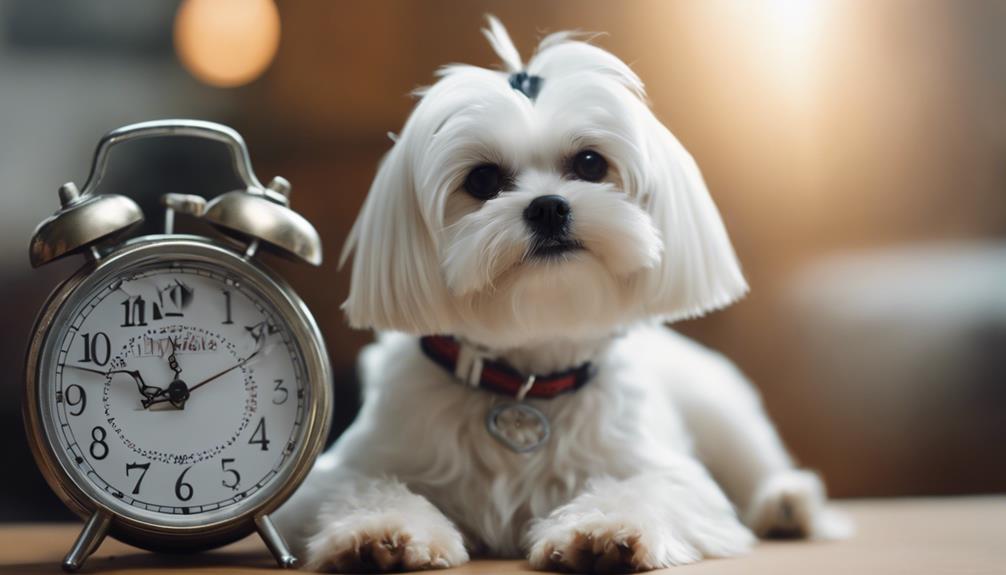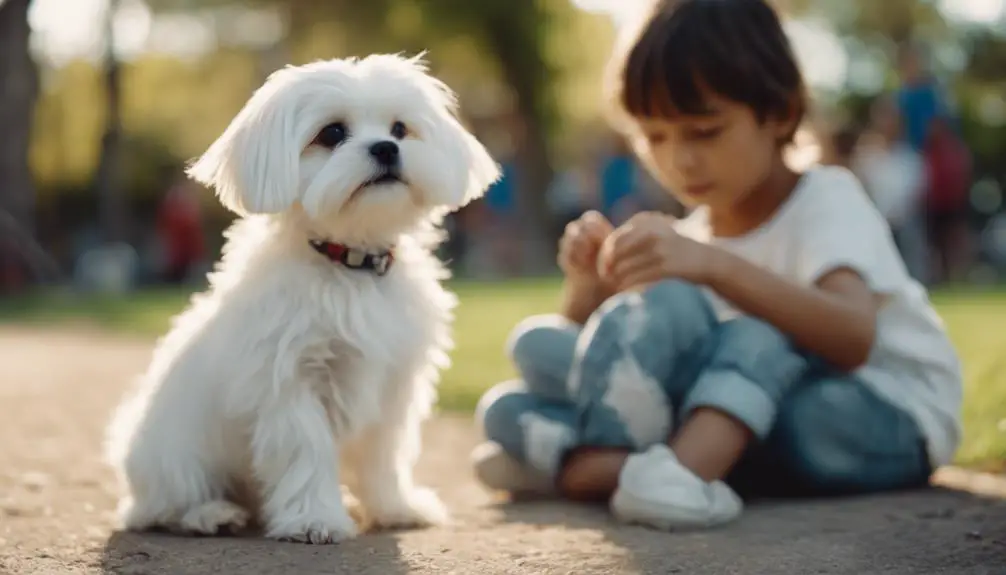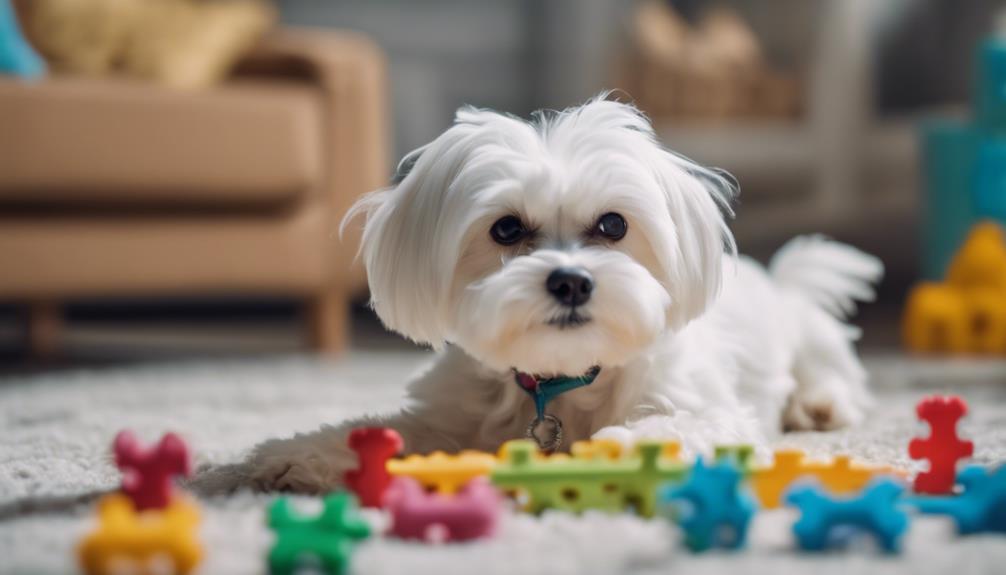Are you tired of your Maltese’s antics causing chaos in your home? It’s time to take control and shape them into the perfect companion you’ve always dreamed of.
By implementing a few simple strategies, you can transform your Maltese into a model pet that will make you proud.
But where do you start on this journey to a well-behaved Maltese? Let’s explore some effective tips that will set you on the path to success with your furry friend.
Establishing a Consistent Routine

To ensure successful training for your Maltese, start by establishing a consistent daily routine. Dogs, especially Maltese, thrive on predictability and structure. By setting regular times for feeding, potty breaks, walks, playtime, and training sessions, you provide a stable environment that helps your furry friend feel secure and understand what’s expected of them.
When creating a routine for your Maltese, consider their individual needs and temperament. Some Maltese may prefer early morning walks, while others might be more active in the afternoon. Tailor the schedule to suit your dog’s preferences and energy levels. Consistency is key to reinforcing good behavior and ensuring your Maltese learns quickly.
Incorporate mental and physical stimulation into your Maltese’s daily routine. These intelligent dogs thrive on challenges and enjoy learning new tricks. Puzzle toys, interactive games, and short training sessions can keep your Maltese engaged and mentally sharp. Remember to keep training sessions brief and positive to prevent your Maltese from becoming bored or frustrated.
Positive Reinforcement Training Techniques
When training your Maltese, utilize positive reinforcement techniques to encourage desired behaviors effectively. Positive reinforcement involves rewarding your Maltese with treats, praise, or toys when they exhibit good behavior. This method helps your Maltese associate positive outcomes with their actions, making them more likely to repeat these behaviors in the future.
To effectively use positive reinforcement, timing is key. Make sure to reward your Maltese immediately after they display the desired behavior. This instant gratification helps them understand which behavior led to the reward. Consistency is also crucial. Always reward the same behavior in the same way to prevent confusion.
When training your Maltese, focus on rewarding behaviors you want to see more of rather than punishing unwanted behaviors. For example, if you’re teaching your Maltese to sit, reward them as soon as their bottom touches the ground. This clear and immediate reward reinforces the action.
Remember to vary the rewards you offer your Maltese to keep them motivated. Some Maltese may be more food-motivated, while others may prefer toys or verbal praise. By understanding what motivates your Maltese, you can tailor the rewards to their preferences, making training sessions more effective and enjoyable for both of you.
Socializing Your Maltese From an Early Age

Socialize your Maltese puppy from an early age to help them develop good behavior and social skills. Early socialization is crucial for your Maltese to grow into a well-adjusted and friendly companion. Exposing your puppy to various environments, people, and other animals will help prevent fearfulness and aggression later in life.
Start by introducing your Maltese puppy to different sights, sounds, and experiences in a positive and controlled manner. Take them for short walks in busy areas, let them interact with other dogs in a safe environment, and invite friends and family over to meet and play with your puppy. Positive interactions will help your Maltese feel comfortable and confident in diverse situations.
Enrolling your Maltese in puppy classes can also be beneficial for their social development. These classes provide opportunities for your puppy to interact with other dogs and learn important social cues. Additionally, they can help with basic obedience training and strengthen the bond between you and your furry friend.
Remember to always supervise your Maltese during socialization to ensure their safety and well-being. If your puppy shows signs of fear or discomfort, gently remove them from the situation and try again later. Consistent and positive socialization experiences will set the foundation for a well-behaved and sociable Maltese companion.
Addressing Behavioral Issues Promptly
Addressing behavioral issues promptly is crucial in ensuring your Maltese develops into a well-behaved and balanced companion. When you notice any undesirable behavior in your Maltese, it’s essential to address it promptly to prevent it from becoming a habit. Consistency and patience are key when correcting behavioral issues. Remember that your Maltese looks to you for guidance and will respond best to positive reinforcement.
Common behavioral problems in Maltese dogs include barking excessively, chewing on furniture or shoes, jumping on people, or showing signs of separation anxiety. Each of these issues can be addressed through proper training techniques. For example, if your Maltese is barking excessively, identify the trigger and work on desensitizing them to it gradually. If they’re chewing on items they shouldn’t, provide them with appropriate chew toys and praise them when they chew on those instead.
It’s important to remember that consistency is crucial in addressing behavioral problems. Set clear boundaries and stick to them. Reward good behavior with treats, praise, or playtime, and redirect or ignore unwanted behavior. If you’re struggling to address a specific behavioral issue, consider seeking help from a professional dog trainer who can provide guidance tailored to your Maltese’s needs. By addressing behavioral issues promptly and consistently, you can help your Maltese become a well-behaved and balanced pet.
Incorporating Mental Stimulation Activities

To enhance your Maltese’s well-being and behavior, consider incorporating mental stimulation activities into their daily routine. Maltese dogs are intelligent and active, requiring mental challenges to prevent boredom and potential behavior issues. One effective way to provide mental stimulation is through interactive toys that dispense treats when solved. These toys engage your Maltese’s problem-solving skills and keep them entertained while rewarding them for their efforts.
Another great mental stimulation activity is obedience training. Teaching your Maltese basic commands like sit, stay, and come not only exercises their mind but also strengthens the bond between you and your furry friend. Training sessions should be kept short and positive to maintain your dog’s interest and motivation.
Engaging in scent games is an excellent way to stimulate your Maltese’s senses. Hide treats around the house or in the yard for them to find using their keen sense of smell. This activity taps into their natural hunting instincts and provides a fun and rewarding challenge.
Incorporating daily walks in different environments can also offer mental stimulation by exposing your Maltese to new sights, sounds, and smells. Allowing them to explore and interact with their surroundings can prevent boredom and help them stay mentally sharp.
Conclusion
In conclusion, training your Maltese to be a well-behaved pet requires patience, consistency, and positive reinforcement.
By establishing a routine, using positive training techniques, socializing from an early age, addressing behavioral issues promptly, and incorporating mental stimulation activities, you can help your furry friend become the perfect companion.
Remember, every dog is unique, so be patient and understanding as you work towards building a strong bond with your Maltese.
With dedication and love, you can achieve great results in training your Maltese to be a well-behaved pet.


